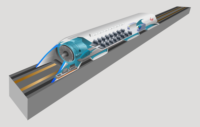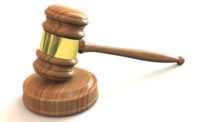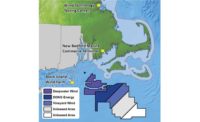Utility Permit Alone Might Not Propel East Coast Hyperloop

The Maryland attorney general’s office has called into question the state’s permitting for the planned East Coast Hyperloop project, sited near Baltimore. The State Highway Administration in October gave Elon Musk’s Boring Co. a conditional utility permit to build a 12.4-mile-long tunnel for the still experimental high-speed transit pods, traveling through twin tubes beneath the Baltimore-Washington Parkway. The East Coast Hyperloop track could reduce the trip between New York City and Washington to 29 minutes.
The Hyperloop system “does not produce, transmit or distribute” commodities such as communications, cable television, power, electricity, light, heat, gas, oil, crude products, water, steam or waste. Rather, the Hyperloop moves “people, automobiles and cargo.”
– Maryland Assistant Attorney General David Stamper
But David Stamper, assistant attorney general at the Maryland General Assembly’s Office of Counsel, says the project’s status as a utility doesn’t pass the smell test. In a Jan. 2 letter to state Sen. Ed DeGrange (D), Stamper wrote that the Hyperloop “does not produce, transmit or distribute” commodities such as communications, cable television, power, electricity, light, heat, gas, oil, crude products, water, steam or waste; rather, it moves “people, automobiles and cargo.” Stamper’s letter, originally obtained by the Baltimore Sun, didn’t say the project isn’t feasible but noted it could require more than state utility permits to proceed.
The Maryland Dept. of Transportation disagrees. In a statement, MDOT spokeswoman Erin Henson said, “MDOT does have the right and responsibility to permit construction under state highway right-of-way, including the conditional permit issued to The Boring Co. to build a concrete shell under the Baltimore-Washington Parkway. As stated months ago, the Federal Railroad Administration would provide the appropriate federal approvals for Hyperloop.”
The project, which, according to Stamper’s letter, is “anticipated” to start this month, would include parallel tunnels, each with 14-ft boring exterior diameters and 12-ft interior diameters.
Project manager AECOM declined to comment. DeGrange didn’t respond to requests for comment. The Boring Co. didn’t respond, either, but is in discussions with the National Park Service, which owns the highway.
In a statement, NPS spokeswoman Jenny Anzelmo-Sarles said the agency “is considering how such a project might be authorized and what steps would be needed to assess any potential impacts to park resources.”




